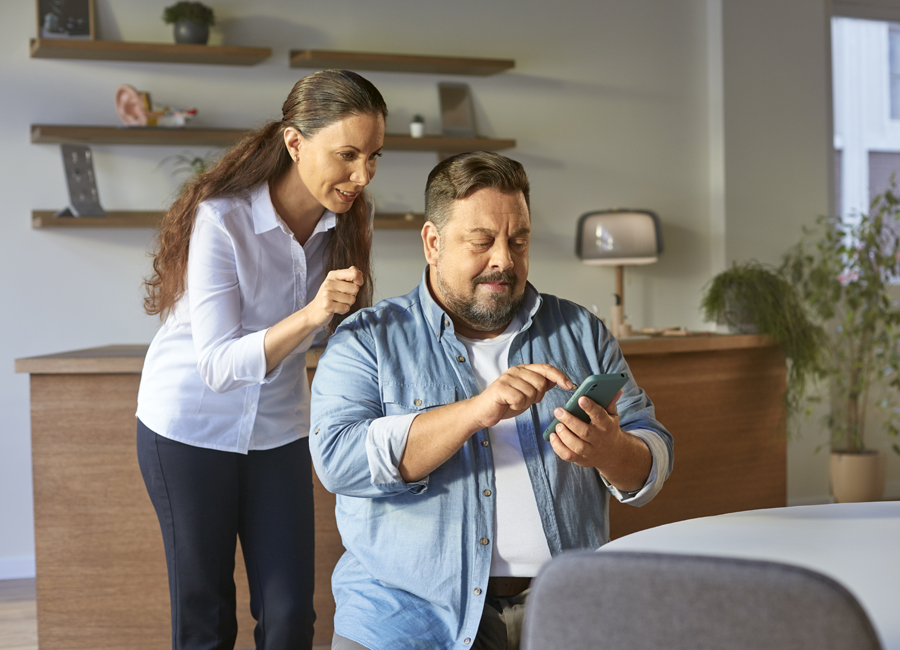Ready For a Change of Mindset?

Let’s make ear and hearing care a reality for all!
As with many things, we tend not to think too much about ear health or hearing loss until it affects us or someone we love. In fact, it’s possible that the only time we consider looking after our hearing health is when we notice we have a problem.
And sometimes even then we don’t seek help because perhaps we’re embarrassed by the thought of losing our hearing, think it’s normal and no big deal, or have had our concerns minimized by healthcare providers in the past.
The World Health Organization (WHO) wants to change that with this year’s World Hearing Day theme: Changing mindsets – making ear and hearing care a reality for all. Celebrated on March 3, this year’s objective is to overcome the challenges posed by societal misconceptions and stigmatizing mindsets that limit efforts for preventing and addressing hearing loss.1
Part of that is knowing more about how and when to care for our ears.
Get proactive about your hearing health
The fact is, ear and hearing problems are among the most common issues patients talk to their primary care providers about at medical appointments. But we don’t have to, and shouldn’t, wait until there’s a problem before giving our ears a little TLC.
There’s so much we can do to care for and protect our ears before hearing loss begins to impact our lives, and World Hearing Day is the perfect day to educate ourselves and take action!
Love your ears
WHO2 recommends the following safe-listening and ear-care tips to help prevent hearing loss and to protect your ears:
- Set your device’s volume level to no more than 60% of maximum.
- Use well-fitted and noise cancelling headphones.
- Limit time spent in noisy environments and take regular breaks in a quiet area to give your ears a rest.
- Protect your ears from loud sounds by wearing ear plugs in noisy places and by moving away from the source of loud sounds.
- Never put cotton swabs – or anything else – inside your ears.
- Don’t share earphones or ear plugs with other people.
- Don’t try home remedies, oils or ear drops that haven’t been prescribed by a hearing health professional or doctor to treat ear pain.

Time for a check-up?
Perhaps the most important piece of advice from WHO is to make sure that you get your hearing checked regularly – not just when you suspect you have a problem.
So, when you call to make appointments for your annual physical and dental check-ups, remember to make an appointment to have your hearing checked too!
This is especially important as we get older because age-related hearing loss is one of the most common conditions affecting older adults. It often arises due to changes in the inner ear, but other factors can include genes, certain medical conditions, side effects of certain drugs and medications, smoking and repeated exposure to loud noises.
Remember, hearing loss is permanent. Once you lose it, it won’t come back. If you have any signs of hearing loss including persistent ringing in the ear, difficulty hearing high-pitched sounds or trouble following conversations, visit your doctor or a hearing health professional right away. Treating hearing loss as soon as you notice it will allow you to continue doing all the things you love and make you, you.
If it’s been a while, why not show your ears some love on World Hearing Day by taking advantage of a free, comprehensive hearing assessment and a free, 30-day hearing aid trial at a HearingLife clinic near you!
HearingLife forms the largest network of hearing clinics with over 400 network clinics across Canada. Staffed by certified hearing healthcare professionals, HearingLife offers the most advanced hearing aid technology and up-to-date diagnostic equipment, as well as clinical support and exclusive 360-AfterCare. #KeepBeingYou and visit HearingLife to book an appointment for your free trial today.
SOURCES
1 https://www.who.int/campaigns/world-hearing-day/2024
2 https://www.who.int/teams/noncommunicable-diseases/sensory-functions-disability-and-rehabilitation/primary-ear-and-hearing-care-training-manual

